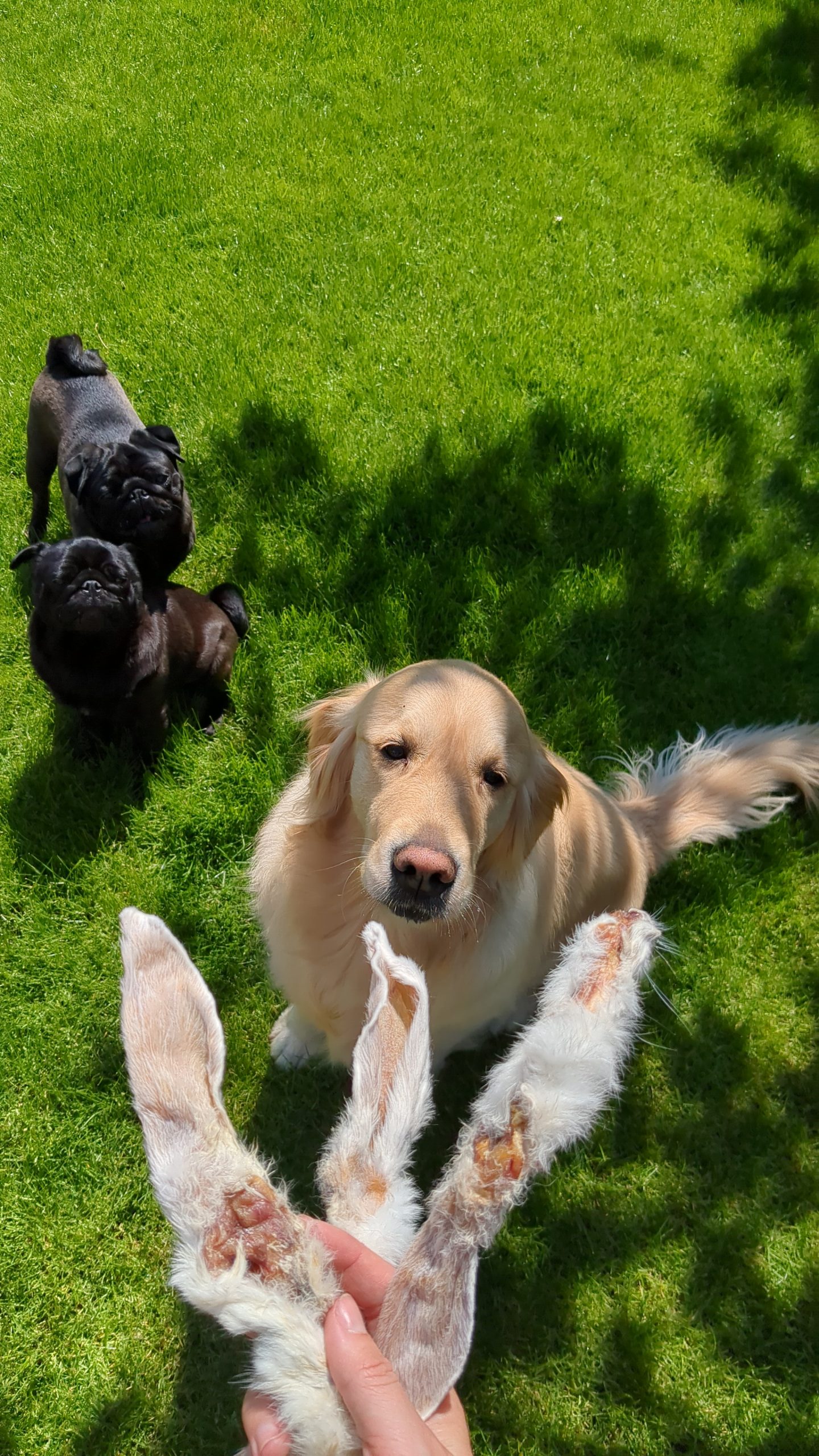
By: Georgina – Owner of Norbert’s Treats
Published: 15th October 2023 | Last Updated: October 2023
Verified by Experts. This article has been written and verified by natural dog treat specialists.

Yes, absolutely! Rabbit ears: the munchy, scrunchy, chewable kind (and not an item from your cute pooch’s dressing-up box) are a highly nutritious, protein-rich treat for dogs of all shapes, sizes and ages.
Rabbit ear protein helps to maintain healthy muscles, hair, and skin and supports other bodily functions, keeping your dog in tip-top condition.
Rabbit treats and chews in general are a great choice for all kinds of dogs.
Rabbit ears are safe for puppies from eight weeks old and dogs up to the senior end of the spectrum.
They’re firm enough to make fantastic chews for puppies between three and five months yet soft enough to be gentle on mature gums.
Yes, hairy rabbit ears are great for dogs. And, yes, they can eat the fur!
We know it seems strange at first. But letting your dog chomp on a hairy rabbit ear is a much closer experience to what they’d get in the wild than with an artificial chew toy.
Your dog won’t think twice about the hair, and neither should you. We’re yet to meet a canine customer that doesn’t love a rabbit ear!
If you can get past them being hairy, rabbit ears are better for your dog than a processed chew full of nasty ingredients. The entire rabbit ear is a healthy, digestible treat containing only cartilage, skin, and hair, as well as some good stuff like zinc, fibre and manganese (a trace mineral that your dog’s body needs to stay healthy).
If you’re not keen on hairy rabbit ears, you might want to check out our guide on ‘Are Pig Ears Good For Dogs?‘
Cut your rabbit ears into small strips for puppies and elderly dogs!
So, hairy rabbit ears are safe for dogs, but are you sold? Read on to learn about this unusual treat’s pros and cons and why you should consider them for your dog as one of many fantastic natural dog treats.
Rabbit ears are widely considered a natural wormer that complements medicinal wormers (which you should still use). Hair is a fibre that’s not easily digested, so it ‘brushes’ through your dog’s intestines, taking any nasty parasites, such as worms, with it.
If you see hair in your dog’s poo after they’ve eaten a rabbit ear, don’t panic! It’s completely normal, and you’ll know the rabbit ear has successfully passed through your dog’s system.
As we mentioned, rabbit ears are not a substitute for medicinal dewormers. So, you can supplement your worming programme with rabbit ears anytime.
They’re safe for puppies, elderly dogs, and every dog in between.
Adult dogs like to eat rabbit ears whole (you may need to keep an eye on gobblers – we’re looking at you, Labradors!), or you may want to cut them into 1-inch strips for puppies.
You may have heard that rabbit ears are hypoallergenic. While this is not strictly true, (hypoallergenic is a marketing term), they’re an excellent option for dogs with food allergies.
Rabbit ears are a novel protein rare or new to your dog’s diet. By introducing rabbit ears, you’re replacing common allergens and reducing the risk of an allergy flare-up.
Rabbit ears are also low fat (check the pack information as fat content varies) and easy to digest.
All natural chews are mild to moderately abrasive, making rabbit ears a brilliant natural plaque remover for dogs!
Allowing your dog to munch regularly on rabbit ears or other natural dog chews reduces the need for a scale and polish (which, let’s face it, no dog likes!)
Or even worse, kidney issues caused by poor dental hygiene.
As if those benefits aren’t enough, chewing is scientifically proven to help your dog relax and feel less anxious by releasing ‘happy hormones’ known as endorphins.
Certain high-energy breeds, such as greyhounds, have super-speedy metabolisms, which can result in loose stools. The fur in hairy rabbit ears binds with undigested food, firming up stools and leaving the intestines free to absorb more nutrients.
Feeding a dog with loose stools rabbit ears two to three times per week (or more if it suits their metabolism) could help regulate their poo, making daily dog walks simpler for both of you.
If none of the reasons above convince you, why not let your dog be the judge? Dogs LOVE chewing rabbit ears.
While the fur may do nothing for you (!), it satisfies your dog’s prey drive, tapping into their natural hunting instincts. And who doesn’t love to see their dog happy?

Some experts suggest feeding up to three per week to avoid the risk of compaction (constipation), but ultimately, it’s down to you and your dog to know what’s right for them.
They’re safe to feed your dog daily, but we recommend introducing them gradually and adjusting the amount you add to your dog’s diet according to their needs.
We put various treat boxes together and will happily discuss your specific requirements.
Yes. Rabbit ears are good for puppies and small dogs, down to the smallest chihuahuas!
It’s worth noting that the quality of ears does vary. Most rabbit ears sold in the UK are a byproduct of the European meat industry, where welfare standards are higher than China (the world’s largest producer of rabbit meat).
You can check with your supplier if you’d like to know the origin of your rabbit ears and make sure you get the best quality ears for your dog.
In case you were wondering, Norbert’s Natural Dog Treats rabbit ears are sourced from Europe.
You can feed rabbit ears to puppies from 8 weeks old, and they’re particularly popular with teething puppies; the gnawing helps to alleviate gum irritation.
Vets generally favour rabbit ears as a healthy alternative to less natural chews.
Rabbit ears, enjoyed as part of a balanced diet, offer many health benefits such as improved digestion and reduced anxiety, with less risk of allergic reactions.
Rabbit ears are soft enough to pass through a dog’s digestive system efficiently, and vets acknowledge that they’re not just a novel protein but a novel treat!
If your dog doesn’t chew the ear properly (usually because they’re so eager to bolt the whole thing down!), there’s a chance they’ll regurgitate it.
To prevent this from happening with dogs new to rabbit ears, cut the ear into 1-inch pieces and feed slowly, one piece at a time.
They’ll soon get used to savouring their tasty rabbit treats.
Elderly dogs may also thank you for cutting the ears into small pieces, allowing them to enjoy all the health benefits without choking on large amounts they can’t chew properly.
Sharp scissors are convenient for cutting up rabbits’ ears – and don’t worry about storage. Air-dried rabbits’ ears keep for up to 18 months in an airtight container. We doubt they’ll last that long!
If you’ve gotten this far, you’ll understand that rabbit ears are a great addition to your dog’s diet, giving plenty of health benefits in a fun way.
We get that rabbit ears, especially their hairiness, takes a little getting used to for us humans. But remember, it’s no big deal for your dog. If you’re still undecided, why not let your dog decide by ordering a four-pack of rabbit ears with hair? We know they’ll love them (and you for ordering!) and it won’t be long before you’re bulk buying our 500g rabbit ear pack.
Oh, and it’s not just rabbit ears that come with the fur – rabbit feet for dogs do as well!
Check out our natural rabbit ears if you’re still unsure about the fur.
But, if you’re totally sold, get ready to dive into our natural dog treat subscription boxes for more healthy, natural treats each month.